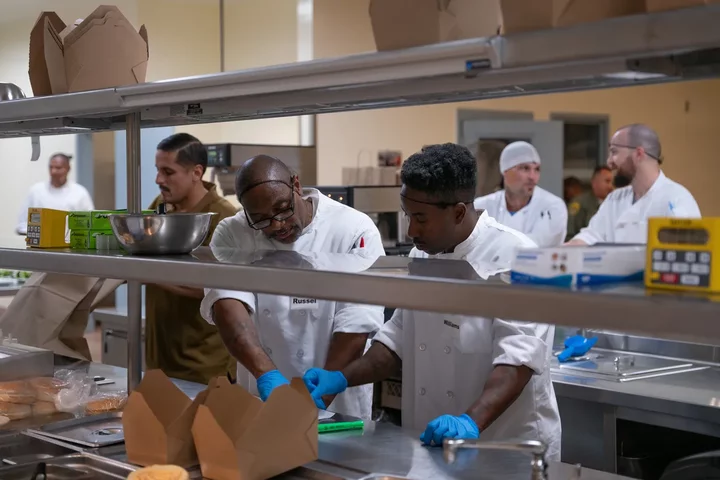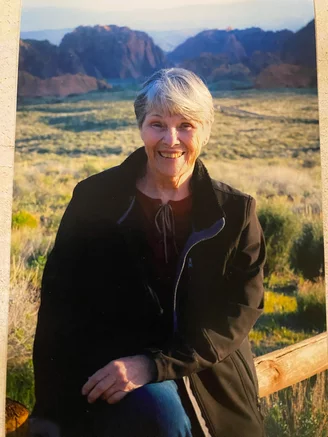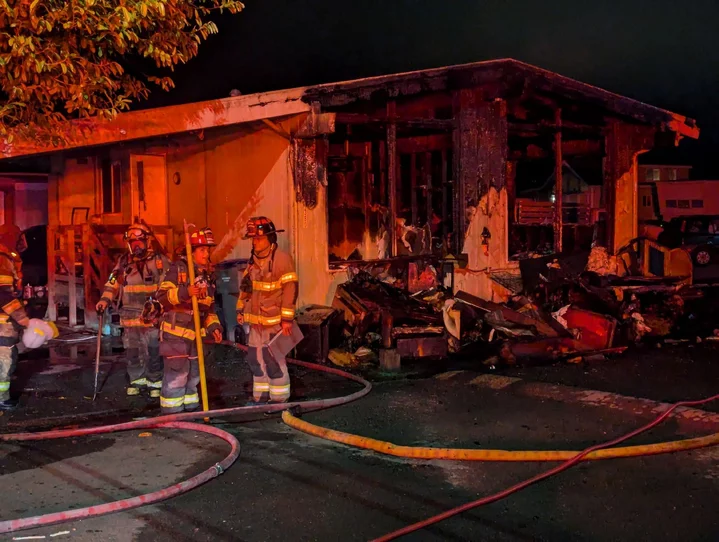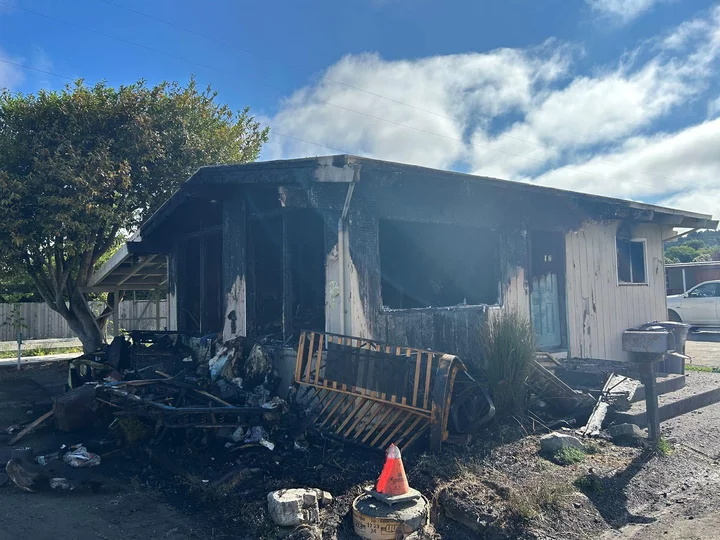SFGate on the International Knuckleheads Who Fly Here to Illegally Climb Hyperion for Social Media Clout
Hank Sims / Tuesday, July 30, 2024 @ 11:30 a.m. / Elsewhere
Everyone should check out Friend o’ the LoCO Ashley Harrell’s story in SFGate this morning.
What’s it about? Pretty much as the headline above suggests, it turns out that there are social media influencer dipshits who regularly come to the North Coast to illegally climb tall trees in Redwood National Park — specifically Hyperion, the tallest tree in the world — in order to post dumb videos of themselves doing so.
Harrell patiently attempts to speak to said dipshits to figure out why the fuck they do what they do; and also to park rangers about the fact that it is absolutely illegal; and also to experienced botanists about how these activities trash the trees and the delicate canopy ecosystem.
Below: “Chasing Adventure: The Arborist,” a 60-minute movie exactly as stupid as its title, featuring one crew of absolute bell-ends doing their idiotic thing.
BOOKED
Yesterday: 4 felonies, 11 misdemeanors, 0 infractions
JUDGED
Humboldt County Superior Court Calendar: Today
CHP REPORTS
1740 Mm96 E Hum R17.40 (HM office): Traffic Hazard
Myrtle Ave / Harrison Ave (HM office): Defective Traffic Signals
ELSEWHERE
RHBB: Wet Winter, Dry Reality? Humboldt Officials Say Water Risk Isn’t Gone
RHBB: College of the Redwoods Del Norte Campus Project Moving Forward with Measure I Funding
RHBB: Major Roadwork Scheduled Friday, February 6 through Thursday, February 12
Fishing the North Coast : Finally — Rain on the Way for North Coast Steelhead Rivers
California Helped This Teen Fight Deportation. Now the Program Is on the Chopping Block
Wendy Fry / Tuesday, July 30, 2024 @ 7:30 a.m. / Sacramento
A California project that provides legal advocacy for unaccompanied child immigrants will end in September unless backers can convince lawmakers to renew funding by next month.
The Children’s Holistic Immigration Representation Project was funded through a one-time allocation in 2022 and not renewed when Gov. Gavin Newsom signed California’s $298 billion budget last month.
There were 64,173 unaccompanied children released in California between January 2015 and May 2023, according to a CalMatters analysis of federal data obtained by the New York Times.
The project’s clients include A.L., who lives with his aunt in Northern California. When A.L. was in the first or second grade, a motorcycle chase ended in the courtyard of his elementary school. He said that he and other young children from San Pedro Sula, Honduras, watched in horror as a group of men surrounded another man, kicked him, beat him, and dragged him all around the school. He never knew why.
“I froze,” said A.L., a 17-year-old who came to the United States as an unaccompanied minor when he was 14. “That’s an example of the violence we live with in my country.”
Honduras has a homicide rate five times higher than the United States, according to the Migration and Asylum Lab, which provides expertise about conditions in Latin American countries for use in asylum applications. San Pedro Sula, the capital where A.L. lived, is called “the world’s murder capital.”
CalMatters is only identifying A.L. by his initials because he fears for his safety and his family’s well-being back in Honduras. We interviewed him with the permission of his sponsor, his aunt, and other advocates.
Without CHIRP, the free legal representation and the social services program A.L. says saved his life, “I’d probably be back in my country,” he told CalMatters.
Rather than providing kids just with legal services, social workers under the project also help children find mental health services, enroll in school, get vaccines, and get work authorization, an approach known as “trauma-informed intervention.”
Unaccompanied children are a particularly vulnerable group. They can be exploited in full-time, dangerous jobs that violate labor laws, advocates and government officials say.
CHIRP was funded as a pilot program with $15.3 million in fiscal year 2022 — enough to carry it through this coming September.
Newsom has not met with anyone to discuss the termination of the project, advocates say. His budget sought to close a huge deficit with $16 billion in cuts and delays.
Newsom’s office declined an interview request about overall cuts to immigration services, but a spokesperson said the governor’s budget maintains nearly $60 million for immigration-related legal services provided to Californians, including students, workers, and unaccompanied minors.
“We don’t find any joy in this – but we’ve got to do it, we have to be responsible. We have to be accountable. We have to balance the budget,” Newsom said previously about general budget reductions amid the funding shortfall.
Time is running out, but not all hope is lost.
“The legislature remains active on CHIRP and [is] exploring possible solutions to ensure its survival,” said Hamid Yazdan Panah, advocacy director of Immigrant Defense Advocates. “We are cautiously optimistic that there will be a path to continue the program, especially given there is no clear alternative for the vulnerable population that it serves.”
The legal advocacy project is in jeopardy just as new federal shifts in immigration policy might prompt an increase in the number of unaccompanied minors being released into California.
In June, President Joe Biden issued an executive order that limits asylum processing after encounters with migrants between ports of entry reach 2,500 per day. The new policy exempts unaccompanied minors, in the same way that such children were eventually exempted from a 2020 order that turned away migrants in the name of stopping the spread of COVID-19. Advocates worry the exemption may prompt parents from dangerous countries to make the hard decision to send their children across the border alone.
“We don’t think that will happen,” said Tom Perez, a senior advisor to the president and director of the White House Office of Intergovernmental Affairs, during a press call in June.
But several years ago, that is the decision A.L.’s parents had to make.
By the time A.L. was 14, gangs in Honduras waited outside his school nearly every single day, threatening him, harassing him, and trying to recruit him, he said. He and his family decided he should flee for the United States.
During the 23-day journey by himself on foot and bus to the U.S.-Mexico border, A.L. said he was robbed by Mexican police. He crossed near the Rio Grande, and U.S. border authorities sent him to live in a center for unaccompanied children in San Antonio, Texas. There, he said, he often didn’t have enough food to eat, and he was not allowed to make phone calls to his family or to find an attorney.

“A.L.,” (far left) an unaccompanied minor from Honduras visits the state Capitol in March of 2024 to advocate for funding for the CHIRP program, which helps protect migrant children alone in the U.S. from deportation. Photo Courtesy of Community Justice Alliance
When he was finally released to his family in California at age 15, he was given a long list of attorneys’ names that he was expected to call on his own to secure legal representation for his pending immigration case.
“I tried to call and call and call many lawyers. Some of them never answered me, and others said they were already too busy. In the end, no one was able to help me. From that long list of attorneys, none of them could help me,” A.L. told CalMatters. Soon, he received a deportation order.
Kristina McKibben, the executive director of Community Justice Alliance, the nonprofit that administers the legal advocacy project, said unaccompanied minors are often expected to navigate the complicated immigration court system without any representation.
“And so, they’re expected to just figure it out,” said McKibben, who said clients as young as third graders can be left to navigate the court system on their own. “I think we all know that it’s ridiculous.”
In 2023, only 56% of unaccompanied migrant children defending their cases in U.S immigration court had attorneys representing them, according to data from the Justice Department. The immigration court system does not guarantee a right to counsel, even for parentless children.
The stakes are high. Between October 2017 and March 31, 2021, 90% of minors without legal representation were ordered removed from the country by federal authorities, according to data provided in a 2021 Congressional Research Service report.
A.L.’s pending deportation order weighed so heavily on him that he couldn’t concentrate or make friends at school.
“I was so lonely because all my classmates were talking about what their daily life was like, or you know, ‘I remember when this happened to me,’ and they were sharing their experiences. And I was always just quiet, listening, … because I was afraid to share my story,” said A.L.
Assemblymember Blanca Rubio, a Democrat from Baldwin Park, said most unaccompanied children who arrive in California are forced to flee their home countries because of violence and abandonment. She is advocating to keep the program because she says it goes beyond just legal representation for minors.
“The program is centered on an understanding that these children have faced trauma, both before coming to the U.S. and within the immigration system itself,” she said in a written statement. “These unaccompanied children are a symbol of resilience and a testament that a better life and future are possible. California should stand with them and invest in a shared future.”
One of A.L.’s teachers frantically started making calls and finally connected him to the advocacy project, which helped him get his deportation order lifted. He’s now living in a legal limbo called deferred action, which means the Department of Homeland Security has agreed not to deport him, but he does not have any official or permanent legal status. One of his advocates said it will be an approximate five-year wait before he can apply to become a lawful permanent resident, or to receive what is commonly referred to as a green card.
A.L. said he’s not afraid to share his story anymore. He recently traveled to the state Capitol to try to convince lawmakers to maintain funding for other children like him.
“Now I feel more confident because I know that I have support,” he said.
###
Data journalist Erica Yee contributed to this report.
This story was reported through a fellowship on U.S. immigration policy in El Paso organized by Poynter with funding from the Catena Foundation.
CalMatters.org is a nonprofit, nonpartisan media venture explaining California policies and politics.
In This California Prison, Inmates Cook for Their Guards and Others, ‘Rely on Each Other’
Carol Pogash / Tuesday, July 30, 2024 @ 7:15 a.m. / Sacramento
Inmates work in the Delancey Street Restaurant kitchen at the California State Prison Solano in Vacaville on July 24, 2024. “We actually built this restaurant,” said Ray Williams, Jr., front right. “We started with hard hats and elevated to smocks.” Photo: Florence Middleton, CalMatters.
Through many metal gates, across an active exercise yard, past cyclone fences topped with curled barbed wire, at the end of a row of neglected warehouses at the California State Prison Solano, there is an incongruous sight: a restaurant.
The cooks are men serving time for murder and drug and gang-related crimes. They built the restaurant and then learned how to dice jalapeños not from culinary school graduates but from members of Delancey Street Foundation, a self-help residential program for ex-addicts, alcoholics and convicts that has operated in San Francisco for over a half a century. Smaller Delancey Street facilities operate in Los Angeles, New Mexico , North Carolina, South Carolina, New York and Massachusetts.
Unlike most of the California prison system, where there are gang controlled white showers, Black showers and Latino showers, white tables for eating, Black tables and Latino tables, in this open kitchen, the men in starched chef jackets, who are Black, Latino and white, work together.
While California and other states promote normalization — an effort to make prisons more closely resemble the world outside — the restaurant in the prison in Vacaville, 50 miles northeast of San Francisco, is proof that change can happen.


First: The Delancey Street Restaurant, a dining area and work-training program for inmates, at the California State Prison. Last: Cristin Smith, 35, works in the Delancey Street Restaurant kitchen with other inmates at the California State Prison, Solano in Vacaville on July 24, 2024. Photos by Florence Middleton, CalMatters
On a Tuesday in June, a correctional officer who processes arriving inmates, enjoyed a sourdough patty melt with a side order of fried pickles with Sriracha aioli. “I work long, crazy hours,” Officer V. Fera said, referring to her 16-hour shifts, and until this restaurant opened, there was no place to get “healthy, homemade food.”
The restaurant, with 52 seats, is open only to correctional officers, prison administrators, plumbers, teachers, doctors, gardeners and others who work at the prison and to people who work at a nearby state prison called the California Medical Facility.
In the kitchen, Shaylor Watson, 55, imprisoned for two murders he committed when he was 17 and 18, calls himself “the master of tomato soup.” He was completing his day’s work, soaking and sanitizing his knives, which, for security, are tethered to his workstation. “This is my way of making amends for the harm I caused,” he said.

Shaylor Watson works in the Delancey Street Restaurant kitchen at the California State Prison Solano in Vacaville on July 24, 2024. “This program has given me hope again in life. I received an LWOP, or life without parole, sentence which means death by incarceration. Delancey gives me hope to show my life matters. By giving to others, it allows me to feel better about myself.” Watson, 55, has been incarcerated since he was 18 years old. Photo by Florence Middleton, CalMatters
Nearby, Justin Miller, who is Latino and has been in an out of institutions on drug charges since he was 13 and has tattoos climbing up his neck, stood with Ray Williams Jr., a Black inmate who has spent 24 of his 43 years in prison for first degree murder, as they bantered and managed the kitchen.
“Our idea is to teach them skills and teach them how to be decent people even though they’re in a horrible place where decency doesn’t get you far,” said Ramiro Mejia, a Delancey Street graduate who for eight years managed the prison unit.
“These guys get the experience of what it’s like to be a human again,” said Tobias Gomez, a Delancey Street graduate and manager of the prison restaurant. “This wouldn’t be possible anywhere else,” he said. At the restaurant and their cell block there are “no gangs, hatred, racism or segregation,” Gomez said.
Early concerns that correctional officers would not eat what the inmates make have dissipated. Guards, nurses, administrators and maintenance workers have been won over by the $10 buttermilk crispy fried chicken sandwiches with homemade slaw, the $15 burger with maple-candied apple wood bacon on a Brioche bun and the $6 quesadilla with pico de gallo and guacamole. Free delivery has led to a bustling take-out business since the restaurant is quite a distance from almost anywhere else in the prison, although there can be issues: When two gates malfunctioned, Rob Souza, a state assessor who also does deliveries, got stuck with brown bag lunches for delivery for an hour and a half.
Delancey Street in the prison opened in March 2015 with 90 handpicked prisoners. Plans for a restaurant were delayed by the COVID-19 pandemic.
“This is my way of making amends for the harm I caused.”
— Shaylor Watson, inmate, California State Prison Solano
The engine of all things Delancey Street is Mimi Silbert, the diminutive 82-year-old co-founder and chief executive with a Ph.D. in criminology from the University of California, Berkeley. She works with sentencing judges and people who have hit bottom. Candidates commit to two years of tough commitments, learning how to live a crime-free, drug-free life. They learn vocational, academic and social skills. “We get lots of gang members,” Silbert said,” Delancey Street teaches them “how to rely on each other,” she said.
Part of that involves food. Silbert believes meals eaten together — the inmates built a long, dining room table where they eat together — creates a sense of family. And Delancey Street members with kitchen training can enter “an industry that doesn’t discriminate,” Gomez, the manager said.
“The whole point of Delancey” and the prison honors unit “is to show that the people with the problems become their own solutions,” Silbert said. With no chef, “It’s inmates teaching each other.”
Silbert had no desire to work in a prison; Delancey Street teaches people how to live outside of prison. But her longtime friend, Jerry Brown, the former governor who calls her “a saint,” coaxed her to take it on. Gavin Newsom, the current governor, is equally supportive.
Years ago, when Brown wanted to better understand prison gangs, he often dropped by Delancey Street’s San Francisco headquarters and for hours interviewed ex-gang members. Early in his SF mayoral career, when Newsom grappled with alcohol abuse, he visited Delancey Street three times a week, Silbert said. When he became governor, he visited the Delancey Street in the prison to speak to the prisoners.
“The human is crushed by excessive institutionalization,” Brown said in a phone interview from his ranch in rural Northern California. “Mimi gives inmates their personhood,” he said.
Silbert agreed to the deal but insisted it would be on her terms.

Mimi Silbert, president and CEO of the Delancey Street Foundation, at the Delancey Street Restaurant in San Francisco on July 17, 2024. Photo by Florence Middleton, CalMatter
When the warden recommended the best inmates for her program, Silbert objected. “I want the worst of the worst!” she recounted in her best you-better-not-ignore-me voice.
“We wanted guys that were violent and in that world, respected, but also had the skill set to survive,” Meja said. “If we could turn them, then we could get guys to follow them,” he said.
The restaurant opened nearly a year ago. It grosses $7,500 a month, more than covering the $5,000 food cost. Inmates earn a dollar an hour, which goes to their victims or the victims’ families. Delancey Street pays Gomez’s salary. The state pays for Souza, the assessor, who said, “The goal is not so much monetary. The inmates are learning how to be better versions of themselves.”
Only at the Delancey Street Solano does prison food come from excellent local suppliers. But nothing came easily. Silbert said, “When we started, it took us eight months to get a blackboard to write the word of the day,” a Delancey Street practice. For Thanksgiving it took eight months to get approval to serve turkey and roast beef, Silbert said. When she realized she had forgotten napkins, she said, “I called Jerry and said, ‘I need napkins.’”
Earlier this month, at the restaurant’s grand opening, inmates served meals to both Newsom and Brown.
The inmates in the Delancey Street Honors Program at the prison practice “each one, teach one,” becoming proficient in public speaking, debate and constructive criticism. On a Tuesday in June, the word of the day, selected by a group of Delancey Street Solano members, was “quintessential.”
Silbert says the inmates have gone beyond normalization. “They have so many things going against them,” she said. And yet, “they’re doing things that are extraordinary. They’re forming unity out of a world that is not unified. And they’re becoming the absolute best of themselves.”
###
Financial support for this story was provided by the Smidt and Irvine foundations.
CalMatters.org is a nonprofit, nonpartisan media venture explaining California policies and politics.
OBITUARY: Mattie L. Culver, 1938-2024
LoCO Staff / Tuesday, July 30, 2024 @ 6:56 a.m. / Obits
In Memory of Mattie L. Culver
August
1938 – July 2024
It is with great sadness that we share with you the passing of Mattie Culver, beloved sister, mother, grandmother, greatgrandmother(Grandma Gee Gee), mother-in-law and nurse. Mattie was an amazing woman, who provided love, encouragement and support. She lived her life with integrity, style, grace and determination. Mattie has three children: Daniel, Kathy and Karen; six grandchildren, Michael, Matt, Ricki, Rhonda, Alisha and Jake; and nine great-grandchildren. She loved all her family and was an active part of their lives.
Mattie worked as a meter-maid for Eureka PD, then after obtaining her nursing degree she worked as a home health nurse, public health nurse, public health nursing supervisor, a nurse practitioner in Dr. Burleson’s office, then as temporary nursing director and supervisor in Public Health nursing. She then worked seven years in the California Children’s Services Program.
Mattie loved learning about other cultures and lived and worked as a public health nurse in Tok, Alaska. She also loved fishing and while there landed a 135-pound halibut. She also joined the Peace Corp and spent two years working in Malawi, Africa. Mattie made friends wherever she lived and worked. Mattie was a positive role model and mentor for many public health hurses.
Mattie was the matriarch of the family, bringing us all together for barbecues, fishing, fun on the beach, Thanksgivings and the family reunion. Family and friends were always welcome at her home. Mattie became a master gardener and many people have admired the landscaping she did on her property at the corner of Hodgson and W streets.
Mattie was a lifelong learner. Mattie was an artist, painting a landscape on the wall in Karen’s room when they lived on “L” street, in Eureka. Mattie also enjoyed going to the casino and “winning big” and seeing her friends there. Mattie enjoyed the book club, kayaking and having breakfast with the kayak club. She enjoyed making pottery. She enjoyed having her hands in the dirt in h er vegetable garden and enjoyed her many flowers.
We will miss Mattie’s kindness and love and she will remain forever with us in our hearts and actions. There will not be any funeral services per Mattie’s request. If you wish please make a donation to hospice, palliative care, the Eureka Breast Health Program or volunteer at an event that promotes the health of our community.
###
The obituary above was submitted on behalf of Mattie Culver’s loved ones. The Lost Coast Outpost runs obituaries of Humboldt County residents at no charge. See guidelines here.
OBITUARY: Andrew Lamb, 1983-2024
LoCO Staff / Tuesday, July 30, 2024 @ 6:56 a.m. / Obits
Andrew Lamb, 40, passed away on June 13, 2024, in Arcata. Raised in Sacramento, Andrew moved to Arcata in 2002 to attend HSU and spent the next 22 years enjoying life in Humboldt.
Andrew adored his beloved friends and their growing families. His impeccable memory and brilliant sense of humor were complemented by an infectious laugh that always brought joy to everyone around him.
As an audiophile, Andrew had a profound passion for listening to southern rock, jam bands, and bluegrass. His sound system and vinyl collection were some of his most cherished belongings and you could often find Andrew and his lovable companion, Burgess, enjoying their favorite albums.
Andrew is survived by his loving parents, Beverly and Ronald Lamb. His presence will be profoundly missed by all who knew and loved him.
A Celebration of Life is being planned in Sacramento in the fall and will be announced at a later date. Andrew’s life will be celebrated in a manner befitting his joyful spirit and deep love for music.
###
The obituary above was submitted on behalf of Andrew Lamb’s loved ones. The Lost Coast Outpost runs obituaries of Humboldt County residents at no charge. See guidelines here.
It’s PIKEMINNOW DERBY Time! Let’s Get Out on the Eel and Slay Invasive Fish for Fun and Food and Prizes
LoCO Staff / Monday, July 29, 2024 @ 4 p.m. / Fish
Photo: TRIB Research.
Press release from TRIB Research:
“If you can’t beat ‘em, eat ‘em”
The Eel River pikeminnow fishing derby is back. The derby is being put on by a collaboration of groups working to restore native fishes in the Eel River, in part by eradicating invasive Sacramento Pikeminnow. We need your help to remove more pikeminnow this summer! From now through August 31st, anyone with a fishing license (or if under 16 years of age, no license is necessary) can go and catch pikeminnow on the Eel for a chance to win up to $400 in cash prizes and do your part to remove these non-native piscivorous (fish-eating) predators.
Pikeminnow were introduced to the Eel River via Pillsbury Reservoir in the late 1970’s. Since then, they have spread to all the forks of the Eel and are remarkably prolific. They make seasonal migrations within freshwater, based on water temperature, prey availability and spawning preferences. In 2018, The Wiyot Tribe and Stillwater Sciences began a focused effort to monitor the pikeminnow population in the South Fork Eel, develop a better understanding of their prey through diet analysis, and test suppression methods. Since then, the collaboration has grown to include CalTrout, UC Berkeley, the Bureau of Land Management, California Department of Fish and Wildlife and TRIB Research, all working together to determine best practices for pikeminnow removal. A recent method has been to install a channel-spanning weir to limit pikeminnow migration into the upper South Fork Eel. On top of the other factors negatively affecting the Eel River such as historic overfishing and logging practices, habitat loss, and impacts from climate change, pikeminnow now have a significant effect on native Pacific Lamprey, coho salmon, Chinook salmon, steelhead and Sacramento Suckers.
The waters open to fishing for the derby are from the mouth of the Van Duzen to the South Fork confluence on the mainstem Eel, and from the mouth of the South Fork to the Humboldt County line (near Piercy) on the South Fork Eel. All current fishing regulations for the Eel River apply for the derby (including no bait, barbless artificial lures only). The prize categories are for most pikeminnow (greater than 6 inches or greater than 12 inches) caught during the contest, biggest fish caught and a drawing for anyone who enters a fish.
We recommend eating your pikeminnow in the form of fried fish cakes, fish balls in noodle soup, fish tacos or smoking them. Don’t believe the common misconception that pikeminnow are inedible. They are delicious, they just need extra care to deal with the y-bones.
For more details on how to enter the derby visit https://tribresearch.org/pikeminnow/
Arcata Fire Puts Out Fire in Manufactured Home Off Alliance Early This Morning, But Not Before Lots of Damage Was Done
LoCO Staff / Monday, July 29, 2024 @ 11:41 a.m. / Fire
Photo by VLU member Dave White. Photos: Arcata Fire District.
Press release from the Arcata Fire District:
On Monday, July 29 at 3:24 A.M., the Arcata Fire District was alerted to a residential structure fire on the 3000 block of Alliance Road.
The first of Arcata Fire’s engines arrived on scene to find a manufactured home on McCallum Circle fully involved with heavy fire showing out of the two front-facing windows.
Dispatch had noted a possible victim trapped inside the building, however the single resident arrived home while fireground actions were taking place. The two remaining Arcata Fire engines arrived to finish the extinguishment of the building, and no occupants were found inside.
Firefighters encountered many obstacles in the home due to an accumulation of possessions which made entry to the residence challenging.
The cause of the fire is suspected to be a space heater that was left on and unattended. Arcata Fire would like to extend our gratitude to mutual aid partners Blue Lake Fire, Humboldt Bay Fire and Westhaven Fire who all assisted with overhaul.
Arcata Fire would like to remind residents not to leave space heaters on and unattended.
Photo by Asst. Chief McDonald.






